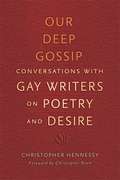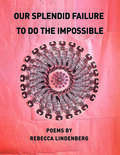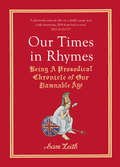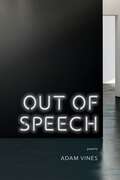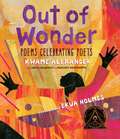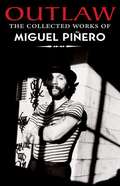- Table View
- List View
Our Celebración!
by Susan Middleton ElyaA delightful rhyming romp through the festivities of a small town's summer parade and celebration, written in English with Spanish words sprinkled throughout.It's a sunny summer day. Come join the crowd headed for the parade! Marvel at the people riding motorcycles, bicycles, tricycles, and unicycles. Duck out of the way as firefighters spray water on hot spectators. Clap to the music as bands of musicians playing clarinetes, saxophones, flautas, trumpets, and drums march by. Feast on lemonade, watermelon, tacos, and ice cream. Wave to the corn princess as her float passes by. Then take cover when a quick rain shower comes, followed by a bright rainbow. Back in the town plaza as night falls, marvel at the sparkling fireworks that end the day's festivities. Pop, pop, pop! ¡Bón, bón, bón! With engaging text and imaginative, whimsical illustrations, Our Celebración! is the perfect way to enjoy a summer day--and learn some Spanish too!
Our Corner Store
by Robert HeidbrederThis delightful novel in verse follows the adventures of a brother and sister around the neighborhood, and especially at the corner grocery store! Race you to our corner grocery store!Stanstones’ corner store is the heart of the neighborhood for the brother and sister in this story. They help to close the store every Saturday and save their pennies to buy candy. The store is the source of many adventures, where they spend a memorably spooky Halloween, play tricks on Mr. and Mrs. Stanstones, and form a search party to find Toby the store cat when he goes missing. What will happen to their beloved corner store when a brand-new supermarket opens up in town? Full of humor and playful language, this novel in verse is a sweetly nostalgic celebration of a time when children had more freedom and a mom-and-pop corner store might be the center of a kid’s world. Based on Robert Heidbreder’s childhood, this follow-up to Rooster Summer can be read as a sequel or a stand-alone story. Chelsea O’Byrne’s vibrant illustrations bring the corner store and its colorful cast of characters to life. Correlates to the Common Core State Standards in English Language Arts: CCSS.ELA-LITERACY.RL.2.4 Describe how words and phrases (e.g., regular beats, alliteration, rhymes, repeated lines) supply rhythm and meaning in a story, poem, or song.
Our Creative World: Stories, Poems, Documents, Art, and Architecture from World History
by Notgrass CompanyOur Creative World is part of the Notgrass "From Adam to Us" one-year world history and literature curriculum for students in grades 5-8. It features primary documents that accompany the curriculum, including stories, poems, documents, and pictures of art, artifacts, and architecture. Entries include a short contextual introduction.
Our Deep Gossip: Conversations with Gay Writers on Poetry and Desire
by Christopher HennessyFrom Walt Whitman forward, a century and a half of radical experimentation and bold speech by gay and lesbian poets has deeply influenced the American poetic voice. In "Our Deep Gossip," Christopher Hennessy interviews eight gay men who are celebrated American poets and writers: Edward Field, John Ashbery, Richard Howard, Aaron Shurin, Dennis Cooper, Cyrus Cassells, Wayne Koestenbaum, and Kazim Ali. The interviews showcase the complex ways art and life intertwine, as the poets speak about their early lives, the friends and communities that shaped their work, the histories of gay writers before them, how sex and desire connect with artistic production, what coming out means to a writer, and much more. While the conversations here cover almost every conceivable topic of interest to readers of poetry and poets themselves, the book is an especially important, poignant, far-reaching, and enduring document of what it means to be a gay artist in twentieth- and early twenty-first-century America.
Our Europe
by Laurent GaudéThis “urgent, epic” poem exploring the history of Europe “encourages both lucidity and humility, to try and save what beauty is left in the world” (Les Echos, FR).“For some time now, Europe seems to have forgotten it is the daughter of epics and utopia. It has been drained by its inability to remind its citizens of this. Too distant, disembodied, the concept often arouses nothing more than disillusioned boredom. And yet, the history of Europe is one of constant upheaval. So much fire and death; inventions and art, too. Literature, perhaps, can remind us of this: that the European history is one of muscle, vigour, passion, anger and joy.”—Laurent Gaude, from the introductionIn Our Europe, Prix Goncourt-winning author Laurent Gaude makes an impassioned plea for Europeans to remember their history and heritage. From the industrial revolution through two world wars and to the birth of the European Union, Our Europe sets in free verse the story of 150 years of growth, confrontation, hope, defeat and passion. It is both “an Iliad for our times” and a heartfelt appeal for a Europe that celebrates difference, solidarity, and freedom (L’Echo de Bruxelles, FR).
Our Farm: By the Animals of Farm Sanctuary
by Maya GottfriedMaya the cow, J.D. the piglet, Hilda the sheep, and a dozen more animals all speak directly to the reader, showing off their unique personalities in this wonderful collection of poems. Master watercolorist Robert Rahway Zakanitch provides a portrait that perfectly captures the essence of each creature. Together the poems and paintings add up to a picture of life on the friendliest farm around.Maya Gottfried based her poems on real animals from Farm Sanctuary, a safe haven for injured or abused farm animals with locations in New York and California.
Our Food: A Healthy Serving of Science and Poems
by Grace Lin Ranida T. McKneallyAward-winning author Grace Lin joins science writer Ranida T. McKneally to get kids talking about the science of food, the five food groups, and what a healthy meal looks like. Answering questions like "why are so many vegetables green?", "What's the difference between brown bread and white bread?", and "Why do beans make you gassy?", cheerful haiku poems and a simple Q&A format make this book a nutritious treat. The information in this book aligns with both the USDA's MyPlate guidelines and the Harvard School of Public Health's Healthy Eating Plate guidelines and back matter includes further information about healthy eating and nutritional guidelines, as well as a glossary.
Our Friendly Friends
by Louis SlobodkinDelightful verses of our relationships to the friendly animals children are most familiar with. For instance, it tells about after a party where Some eat a lot And some eat less, And some drink water, Others drink dew, Some drink milk Just like you. A good book for quiet time.
Our Hands Hold Violence: Poems
by Kieron WalquistA NATIONAL POETRY SERIES WINNER SELECTED AND WITH A FOREWORD BY BRENDA HILLMAN A collection of poems that explores rural Missouri, violence, queer desire / intimacy, addiction, familial and wildlife relationshipsThrough encounters with the everyday beauty and brutality so much a part of rural and urban Missouri, Our Hands Hold Violence explores what it means to experience and/or perpetuate small and significant acts of violence, toward others and the self.What does it mean to hunt (be hunted), haunt (be haunted), and other (be othered)? Abiding by a chronological arc told in four movements (HERE, THERE, TOGETHER, ALONE), OHHV follows the speaker(s) as they come up in the Show Me State and come to terms with queerness, mental disability, addiction, and loneliness in the largely Christian, conservative, and hyper-masculine landscape. Other themes / aspects of note include familial dynamics, estrangement, labor, neglected and decaying natures, waste, and the confluence of wildlife and mankind.Comprised of traditional forms and modes such as the abecedarian, ekphrasis, sestina, and more hybrid configurations (billboards, bullet points, McDonald&’s Monopoly stickers), as well as photographs, OHHV is interested, too, in changing/challenging structure and expectations. Thus, enacting a visual and figurative &“violence&” upon the page. Additionally, two poems are contained in a nonce (invented) form called &“Shakes,&” where strophes traverse between left and right points, while the middle column is constructed or cataloged by similar sounds—a form inspired by the author&’s own reality of stimming (i.e. pacing) and echolalia.OHHV indulges in alliteration, assonance, repetition, and a colloquial registry of language. The voice(s) in the poems can range from anxious, reflective (nostalgic), sensual, and tender, but all are compelled by and circle the manuscript&’s themes, which become obsessions. Hauntings. Ultimately, OHHV is a collection troubled by the desire to belong to/in a place and to beloveds that have &“been home&” while, in ways, &“feeling like an outsider&” at home and within one&’s local community.
Our Lady of Bewilderment: Poems (Barataria Poetry)
by Alison PelegrinWhether by way of visitations from secular saints, hauntings from childhood, or back talk from “indelicate broads,” a complicated world speaks to and through Alison Pelegrin in Our Lady of Bewilderment. An unusual blend of mystic-comedian, Pelegrin explores physical and psychic beauty and terror without losing sight of wonder. Drawing on the aid of beings real and imaginary, Our Lady of Bewilderment offers humorous, honest, and intimate poems contemplating life’s traumas and joys, filtered through the religion-infused secular traditions of Louisiana.
Our Latest in Folktales
by Matthew GwathmeyPoems of serious wordplay—an affirmation and celebration of the spectacles we make of our lives. On-stage in Matthew Gwathmey’s debut collection are agitated 19th century horsemen, 80s comic book beetles, plaid-clad suburban grunge enthusiasts, Korean aunts turned traffic cops, Parisian mimes—in short, “a multitude of horns.” Meanwhile, the “understories,” the sub-spectacles of these poems, are the everyday trials and thrills of marriage and family, the search for meaningful love and friendship, and the palpable relief at being able to perform not as a primary character in the cultural narrative, but as a member of an elemental audience, as “water/ at the bottom of the wind.” Working a hand-mixer in one hand and a spade in the other, Gwathmey writes formally accomplished, linguistically playful poems with deep roots. He couples an implicit understanding of the stories passed down to us as necessary blueprints, with an occasionally nihilistic (in the spirit of the modernists) and occasionally giddy (in the spirit of the New York School) pull toward embellishment and reinvention, making these folktales rhythmic, humorous, and full of unexpected turns.
Our Life Grows
by Adam Michnik Ryszard Krynicki Alissa VallesThe first uncensored, English-language translation of a Polish dissident poet's brave act of witness in post-World-War-II Europe.The Polish poet Ryszard Krynicki, born in a Nazi labor camp in Austria in 1943, became one of the most prominent poets of the New Wave generation of 1968, his poetry offering what Adam Michnik has called “a strange and beautiful marriage of Joseph Conrad's heroic ethics with a great metaphysical perspective.” Krynicki is the author of a body of work marked at once by the solitude of a poète maudit and solidarity with a hurt and manipulated community. Our Life Grows, published in Paris in 1978, was the first poetry collection to appear as Krynicki intended, beyond the reach of the Communist censorship that had crippled his earlier books. These poems, combining a biting wit and rigorously questioning mind with a surreal imagination, are a vital part of the story of postwar Europe.
Our Literary Universe: Anthology of Prose and Poetry
by Kate Chamberlin Wayne Writers GuildThe Wayne Writers Guild has released its 7th anthology of prose and poetry. The creative works of Mert Bartels, Rita Goebert, Chuck Martin, Tim Piper, William Preston, Alex Reid, Jennifer Weykman, and contributing editor Kate Chamberlin will take you to Scotland, Ancient Rome, and Friday Harbor on San Juan Island; get sage advice from a Great-Grandmother and an old mountain climber; experience a farm boy emerge as a military man; experience sci-fi traces of humanity and very human Main Street Christmas Memory; as well as, thoughts on the Vernal Equinox, pets, and letting go. There is something you’ll be thinking about long after you finish reading this anthology.
Our Little Kitchen
by Jillian TamakiA picture book about a lively evening in a community kitchen from Governor General’s Award–winning author and illustrator Jillian Tamaki. Tie on your apron! Roll up your sleeves! Pans are out, oven is hot. The kitchen’s all ready, Where do we start?In this lively, rousing picture book from Caldecott Honoree Jillian Tamaki, a crew of resourceful neighbours come together to prepare a meal for their community. With a garden full of produce, a joyfully chaotic kitchen and a friendly meal shared at the table, Our Little Kitchen is a celebration of full bellies and people looking out for one another. Includes two recipes and an author’s note about the volunteering experience that inspired the book. Key Text Features illustrated recipes author's note speech bubbles Correlates to the Common Core State Standards in English Language Arts: CCSS.ELA-LITERACY.RL.1.4 Identify words and phrases in stories or poems that suggest feelings or appeal to the senses. CCSS.ELA-LITERACY.RL.2.4 Describe how words and phrases (e.g., regular beats, alliteration, rhymes, repeated lines) supply rhythm and meaning in a story, poem, or song.
Our Nest
by Reeve LindberghWith soothing language this gentle picture book leads children from the warm nest of their bed to the ever-expanding embrace of the world around them. Snuggled in bed, You're all safe and warm, Like a bird in a nest in a tree. A child tucked in bed, a doe curled in the grass, a boat anchored in the harbor -- everything has a nest. Even the ocean needs the earth to be its nest, while beyond, the universe holds the stars. In this tender poem, Reeve Lindbergh uses an ever-widening focus to show children the vast world beyond their beds, and all the love and comfort to be found there.
Our Old Nursey Rymes (Classics To Go)
by VariousExcerpt: "Sing a song of Sixpence, A pocket full of rye; Four and twenty Blackbirds, Baked in a pie; When the pie was open’d, The birds began to sing, Oh, was not that a dainty dish, To set before the King."
Our Savage Art: Poetry and the Civil Tongue
by William LoganThe most notorious poet-critic of his generation, William Logan has defined our view of poets good and bad, interesting and banal, for more than three decades. Featured in the New York Times Book Review, the Times Literary Supplement, and the New Criterion, among other journals, Logan's eloquent, passionate prose never fails to provoke readers and poets, reminding us of the value and vitality of the critic's savage art.Like The Undiscovered Country: Poetry in the Age of Tin, which won the National Book Critics Circle Award in Criticism, Our Savage Art features the corrosive wit and darkly discriminating critiques that have become the trademarks of Logan's style. Opening with a defense of the critical eye, this collection features essays on Robert Lowell's correspondence, Elizabeth Bishop's unfinished poems, the inflated reputation of Hart Crane, the loss of the New Critics, and a damning-and already highly controversial-indictment of an edition of Robert Frost's notebooks. Logan also includes essays on Derek Walcott and Geoffrey Hill, two crucial figures in the divided world of contemporary poetry, and an attempt to rescue the reputation of the nineteenth-century poet John Townsend Trowbridge. Short reviews consider John Ashbery, Anne Carson, Billy Collins, Rita Dove, Louise Glück, Jorie Graham, Robert Hass, Seamus Heaney, and dozens of others. Though he might be called a cobra with manners, Logan is a fervent advocate for poetry, and Our Savage Art continues to raise the standard of what the critic can do.
Our Secret Discipline: Yeats and Lyric Form
by Helen Vendler“An intellectual feast.”—John Leonard, Harper’s MagazineA monumental study reveals the patient and meticulous labor behind the Irish Nobel laureate’s immaculate poetic craft.The fundamental difference between rhetoric and poetry, according to Yeats, is that rhetoric is the expression of one’s quarrels with others while poetry is the expression (and sometimes the resolution) of one’s quarrel with oneself. This is where Helen Vendler’s Our Secret Discipline begins. Through exquisite attention to outer and inner forms, Vendler explores the most inventive reaches of the poet’s mind. This book is a space-clearing gesture, an attempt to write about lyric forms in Yeats in unprecedented and comprehensive ways. The secret discipline of the poet is his vigilant attention to forms—whether generic, structural, or metrical. Yeats explores the potential of such forms to give shape and local habitation to volatile thoughts and feelings.Helen Vendler remains focused on questions of singular importance: Why did Yeats cast his poems into the widely differing forms they ultimately took? Can we understand Yeats’s poetry better if we pay attention to its form, both its internal architectonic and its external organization into conventional verse structures? Chapters of the book take up many Yeatsian ventures, such as the sonnet, the lyric sequence, paired poems, blank verse, and others. With elegance and precision, Vendler offers brilliant insights into the creative process and speculates on Yeats’s aims as he writes and rewrites some of the most famous poems in modern literature.
Our Splendid Failure to Do the Impossible
by Rebecca LindenbergLiving in landscapes of ruin and ruination, memory and problematic nostalgia, Rebecca Lindenberg’s Our Splendid Failure to Do the Impossible plumbs the depths of disruption, decay, and how we go on when the world stops cold. Inspired by the speaker’s experiences of living with type 1 diabetes, the collection chronicles humanity’s daily fight for survival in a world that’s bent on destroying itself.Lindenberg centers love, self-acceptance, and intimacy as incomparable balms across great geographical and psychological distances, and asks the reader to do the impossible: hope.
Our Times in Rhymes: Being a Prosodical Chronicle of Our Damnable Age
by Sam LeithA parliament of fools, or a confederacy of dunces? Blethering celebrities and blundering politicians, royal babies and right royal cock-ups, milkshake madness and vegan sausage rolls - and, of course, the long and winding road to Brexit. If ever the times were ripe for a return to the high days of Augustan satire, it’s now – and the Spectator’s literary editor Sam Leith provides it. Our Times in Rhymes is a waspish, affectionate and very funny look at the state of our nation as it – let's be even-handed - teeters on the cliff-edge of a marvellous opportunity. Here is all the insanity and inanity of 2019, month by cherishable month, rendered in galloping comic verse and paired with satirical drawings by the brilliant cartoonist Edith Pritchett. It makes the perfect Christmas stocking filler for anyone who needs a good laugh at the damnable times we live in.
Out of Speech: Poems
by Adam VinesGrounded in technical mastery, the poems in Out of Speech address issues both universal and timely. In this series of ekphrastic works, Adam Vines explores themes as varied as exile, family, disease, desire, and isolation through an array of twentieth- and twenty-first century painters, including Picasso, Hopper, Rothko, de Kooning, Warhol, Lichtenstein, and Artschwager. He also goes within and beyond these works of art to explore characters set in the present-day museums, from a bored docent to a misinformed “explainer” of an artwork’s meaning. Combining these two views—one that looks at the painting and another that looks around it—his poems affirm the artist’s insights into the complexity of being human.
Out of This World: Poems and Facts about Space
by Amy SklanskyAmy Sklansky and Stacey Schuett give young explorers the moon and stars and beyond! The mysteries of the universe and the science of space exploration are perennialy popular subjects, and Out of This World is a wonderful introduction. Amy Sklansky has written evocative poems about planets and stars and rockets and moon landings and satellites. Each poem is supported by additional facts and explanations in the margins. Stacey Schuett brings it all to life with color-soaked skies and beautiful perspectives in her fabulous paintings. Space is a subject too grand for poetry or prose alone, so this book offers both to help readers truly appreciate our place in space.
Out of Wonder: Poems Celebrating Poets
by Kwame Alexander Marjory Wentworth Chris Colderley Ekua HolmesOut of gratitude for the poet's art form, Newbery Award-winning author and poet Kwame Alexander, along with Chris Colderley and Marjory Wentworth, present original poems that pay homage to twenty famed poets who have made the authors' hearts sing and their minds wonder. Stunning mixed-media images by Ekua Holmes, winner of a Caldecott Honor and a John Steptoe New Talent Illustrator Award, complete the celebration and invite the reader to listen, wonder, and perhaps even pick up a pen.
Outdoor Farm, Indoor Farm
by Lindsay H. MetcalfDiscover how both outdoor and indoor farms sustainably grow the food we eat throughout the year in this vibrant, rhyming picture book.Outdoor farm, tractors toil.Indoor farm,zero soil.With energetic, enchanting verse and sunshiny, colorful illustrations, discover how the food you eat is grown both outside—and inside! Join two children as they explore the inner workings of an outdoor farm and an indoor farm. You&’ll see how a variety of amazing machinery like tractors and drones along with innovative farming techniques yield the wonderful food we all love to enjoy.
Outlaw: The Collected Works of Miguel Piñero
by Miguel PiñeroPart observer, part participant in the turbulent goings-on in his Nuyorican barrio, Miguel Piñero blasted onto the literary scene and made waves in the artistic current with his dramatic interpretations of the world around him through experimental poetry, prose, and plays. Portrayed by actor Benjamin Bratt in the 2001 feature film Piñero, the poet's works are as rough and gritty as the New York City underworld he wrote about and loved. His depictions of pimp bars, drug addiction, petty crime, prison culture and outlaw life are all drawn from first-hand experience. This long-awaited collection includes previously published and never-before-published poems; ten plays, including Short Eyes, which was later made into a film and won the 1973-1974 New York Drama Critics' Circle Award for Best American Play, The Sun Always Shines for the Cool, and Eulogy for a Small Time Thief. A co-founder of the Nuyorican Poet's Café, Piñero died at the age of 41, leaving behind a compelling legacy of poetry and plays that reveal the harsh, impoverished lives of his urban Puerto Rican community.
